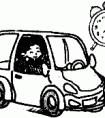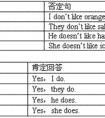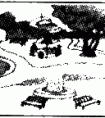句型转换。1. The children are playing in the park. (单数句型)_____________________________________________________________2. The birds are singing in the tree-六年级英语
will be
一般时态有关be动词的口诀:
我用am,你用are,is连接他/她/它,复数形式就用are
be动词的用法:
现在时 I am, you are, he is, we are, you are, they are
(缩略式 I'm, you're, he's, we're, you're, they're),
(否定缩略式 I'm not, isn't, aren't),
过去时 I was, you were, he was, we were, you were, they were
(过去时否定缩略式 wasn't, weren't),
过去分词been,现在分词being
英语的“be”是个特殊动词;有些语言,如马来文等,并没有“be”这样的动词。
“Be”除了原形的“be”之外,还有另外七种形式:
am, is, are, been, being, was, were.
在句子中,“be”可以是主动词(The Principal Verb)或助动词(The Auxiliary Verb)
一、口诀:
我用am,你用are,is连着他,她,它;
单数名词用is,复数名词全用are;
变疑问,往前提,句末问号某丢弃;
变否定,更容易,be后莫忘记;
疑问否定任你变,句首大写莫迟疑。
二、Be动词在一般过去时中的变化:
1、am和is在一般过去时中变为was;
2、are在一般过去时中变为were
3、带有was或were的句子,其否定、疑问的变化和am is are一样,即否定句在was或were后加 not,一般疑问句把was或were调到句首。
考点名称:一般将来时
一般将来时:
表示将来某个时间要发生的动作或存在的状态,也表示将来经常或反复发生的动作。
由“助动词will+动词原形”构成。“be going to+动词原形”结构是将来时的另一种形式,表示将要发生的事或者事先经过考虑打算去做某事。
例:We will go to Shanghai next year. 明年我们要去上海。
We are going to have a football match tomorrow. 我们明天要举行一场足球比赛。
Tom is going to have a bath. 汤姆要去洗澡了。一般将来时常见结构:
1、will / shall + 动词原形(否定句在will/shall后加not)
will 常简略为 'll,并与主语连写在一起,如: I'll,she'll,he'll,it'll,we'll,you'll,they'll。
一般疑问句如用will you…?其简略答语须是Yes,I will或 No,I won't;如用 Shall I…?(较少见)其简略答语须是 Yes,I shall.或 No, I shall not.
这种方法一般单纯地表示将来某个时间将要发生的动作或存在的状态。will用于各种人称;shall只用于第一人称。 例如 :
I will / shall go to visit him next week. 下周我将去拜访他。
What time shall we go there tomorrow? 明天我们几点去那儿?
2、be going to 动词原形
be going to 相当于一个助动词(其中be有人称和数的变化),与它后面的动词原形一起构成谓语。用来表示近期将要发生的动作以及计划、安排和打算要做的事。例如:
There is going to be a football match this afternoon.今天下午将有一场足球赛。
I‘m going to go to the park. 我将要去公园。
常用结构:
1、用于"I expect, I'm sure, I think, I wonder宾语从句"中。
Don't worry about the exam. I'm sure you'll pass.
不要担心这次考试,我确信你会通过的。
2、用于祈使句和陈述句中。
Work hard and you will succeed.
如果你努力,就会成功的。
3、与表示时间或条件的状语从句连用。
I'll let you know as soon as he arrives.
他一到我就通知你。- be going to与will的区别:
be going to与will两者都可表示将要发生的事、将要去做某事,但它们有如下几点区别:
1. be going to 表示近期、将要发生的事情,will 表示的将来的时间则较远一些,如:
He is going to write a letter tonight.
He will write a book one day.
2. be going to 表示根据主观判断将来肯定发生的事情,will表示客观上将来势必发生的事情。
He is seriously ill. He is going to die.
He will be twenty years old.
3. be going to 含有“计划,准备”的意思,而 will 则没有这个意思,如:
She is going to lend us her book.
He will be here in half an hour.
4.在有条件从句的主句中,一般不用 be going to, 而多用will, 如:
If any beasts comes at you, I'll stay with you and help you
注意
be going to和will在含义和用法上稍有不同。be going to往往表示事先经过考虑的打算;will多表示意愿,决心。两者有时不能互换。如:
She is studying hard and is going to try for the exams.她正努力学习并尝试参加考试。(is going to不能用will替换) - 一般将来时一般用法:
(1)一般将来时表示将要发生的动作或情况。
例如:I will(shall) arrive tomorrow.我明天到。(主语是第一人称时最好用shall)
Will you be free tonight? 你今晚有空吗?
We won’t (shan’t) be busy this evening. 我们今晚不忙。
(2)在一般将来时的句子中,有时有表示将来时间的状语,有时没有时间状语,这时要从意思上判断是否指未来的动作或情况。例如:
Will she come? 她(会)来吗?
(3)在以第一人称I或we作主语的问句中,一般使用助动词shall,这时或是征求对方的意见,或是询问一个情况(b):
a. Where shall we meet? 我们在哪儿碰头?
b. Shall we have any classes tomorrow?明天我们有课吗?
在这类问句中,近几年来也有不少人用will,特别是在美国。例如:
How will I get there? 我怎么去?
(4)be going to+ 动词原形
a.表示计划、打算、准备做的事。例如:
We are going to put up a building here.我们打算在这里盖一座楼。
How are you going to spend your holidays?假期你准备怎样过?
b.表示即将发生或肯定要发生的事。例如:
I think it is going to snow. 我看要下雪了。 - 常用时间状语:
1)tomorrow,the day after tomorrow,tomorrow morning/afternoon/evening
2)next year/week/month/hour/day/century
3)in+一段时间
4)in the future
5)this afternoon/Sunday/evening
6)from now on
7)one day,someday (未来的)某天
8)soon
考点名称:否定句
- 否定句:
表示否定的句子。必须有否定词。
否定句的构成形式:
a. 谓语为be动词时,“be+not "一名学生。
b. 谓语为实义动词而且没有情态动词和助动词时,“do/ does/ did+not"构成否定。
例:I do not like dancing. 我不喜欢跳舞。
He does not want to go to school. 他不想去上学。
c. 谓语为“情态动词+实义动词”时,“情态动词+not”构成否定。
例:You must not smoke. 你千万不要吸烟。
I can not catch it. 我抓不住它。 - 否定句在英语语法中可以分为九类:
(1)一般否定句
I don't know this. No news is good news.
There is no person(smoking)/not a person/not any person(smoking)in the house.
(2)特指否定
He went to his office, not to see him.
I am sorry for not coming on time.
I don't think/believe/suppose/feel/imagine you are right.
(3)部分否定
All the answers are not right
All is not gold that glitters
I don't know all of them.
I can't see everybody/everything.
Both of them are not right.
(4)全体否定
None of my friends smoke.
I can see nothing/nobody.
Neither of them is right.
Nothing can be so simple as this.
(5)延续否定
You didn't see him, neither/nor did I.
You don't know, I don't know either.
He doesn't know English, let alone/to say nothing of/not to speak of(更不用说)French.
(6)半否定句
We seldom/hardly/scarcely/barely hear such fine singing.
- 最新内容
- 相关内容
- 网友推荐
- 图文推荐
| [家长教育] 孩子为什么会和父母感情疏离? (2019-07-14) |
| [教师分享] 给远方姐姐的一封信 (2018-11-07) |
| [教师分享] 伸缩门 (2018-11-07) |
| [教师分享] 回家乡 (2018-11-07) |
| [教师分享] 是风味也是人间 (2018-11-07) |
| [教师分享] 一句格言的启示 (2018-11-07) |
| [教师分享] 无规矩不成方圆 (2018-11-07) |
| [教师分享] 第十届全国教育名家论坛有感(二) (2018-11-07) |
| [教师分享] 贪玩的小狗 (2018-11-07) |
| [教师分享] 未命名文章 (2018-11-07) |






